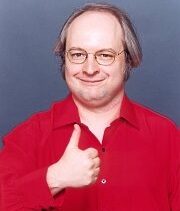Do You Win By Being BIG, Or Do You Win By Being Good?
In his latest Alertbox issue, entitled "Undoing the Industrial Revolution", usability guru Jakob Nielsen, goes out of his familar path and puts out what maybe one of the most important public statements I have ever read from him in nearly 20 years of close readership.

Jakob Nielsen
His focus in his article is on acknowledging the disruptive role that new media technologies and the online world are placing on the very foundations of our society and of our present-day living style.
Jakob does an excellent job of this, first by summarizing the key traits of where the industrial revolution has taken has over the last two centuries and then by correctly identifying the critical emerging traits of the new decentralized ecosystem generated by the new communication networks.
The view he sees is a positive, encouraging one. One that does give breath again to the small, the human, the clever and the intelligent, and not only to the big and financially powerful. There is hope indeed, that the individual of the near future will enjoy again what were once his true riches, and that the traits that characterize today strong market and cultural forces, BIG, centralized, top-down authority, mass-consumption and mass-communication are nothing else but the identifiers of a world that is about to disappear.
Jakob Nielsen writes about the centralized world we are moving away from. These the traits he describes:
- Mass-produced products streamed off the assembly line, giving everyone the same thing, with few variations.
- Centralized manufacturing and business emerged due to the cost of establishing efficient factories.
- Big companies emerged in response to these economies of scale.
- Distance between decisions and execution increased as companies grew and thus required several management levels between executives and workers.
- Employment and jobs became the predominant way to make a living.
- Centralized cities (and later suburbs) attracted most of the population, concentrating it within a very small percentage of each country's landmass.
- Work and leisure separated, with each occupying fixed times and places.
- Mass media (TV, radio, newspapers, magazines, books, motion pictures, and so on) emerged and began broadcasting a small set of messages to a large number of people.
- Mass marketing used mass media to sell mass-produced products to the working masses.
- Image building became a primary means of sustaining market position in a mass-marketing environment crowded with similar products.
Together, these developments have driven unprecedented centralization in human affairs.
This effect is contrary to our dominant historical experience as a species, wherein:
- we lived in places where we knew everyone;
- worked either for ourselves or directly for the leader of a focused team (as on a hunting expedition or farm, or in a crafts shop); and
- had work and lives that were tightly integrated (typically, our homes doubled as our workplaces).
- Custom-built products instead of mass-produced ones.
- Niche products.
- Virtual companies instead of big firms in centralized locations.
- Geographically dispersed companies and services.
- Narrowcasting and one-to-one media are what the Web is all about.
- Reputation replaces image as the way to build a company, product, or brand position. (This is partly because you can't establish an empty, slogan-based brand through mass marketing when there's no mass media. Also, reputation becomes more salient in the virtual world where it can be stored and aggregated.)
These trends drive decentralization and reduce the advantages of being big.
From Centralization To Decentralization: The Experience Switch
In the physical world, you win by being big, with economies of scale in manufacturing, worldwide distribution, and branding. Most of these benefits accrue even if you're mediocre, and in fact, you usually benefit from targeting the lowest common denominator.In the virtual world, you win by being good: Automation reduces the benefits of scale, the Internet equalizes distribution, and reputation follows from quality rather than incessantly repeated slogans.
...
The switch from centralization to decentralization goes to the heart of the human experience. And because the switch will drive up quality, it will tend to be a force for good.
We typically overestimate what can be done in the short term. Improvements seem so close we can smell them, but human behavior and social institutions are slow to change.
At the same time, we underestimate what will happen in the long term, because changes accumulate and accelerate.
...
We are changing aspects of the human experience that have great inertia, however, such as the size of cities and the nature of the corporation and entrepreneurship. These changes can easily take thirty or forty years, but the eventual outcome will be dramatic."
Read more of what Jakob Nielsen thinks of the ongoing shift from centralization to decentralization in this milestone article.
A must read.
Reference: Jakob Nielsen - Alertbox [ Read more ]

blog comments powered by Disqus